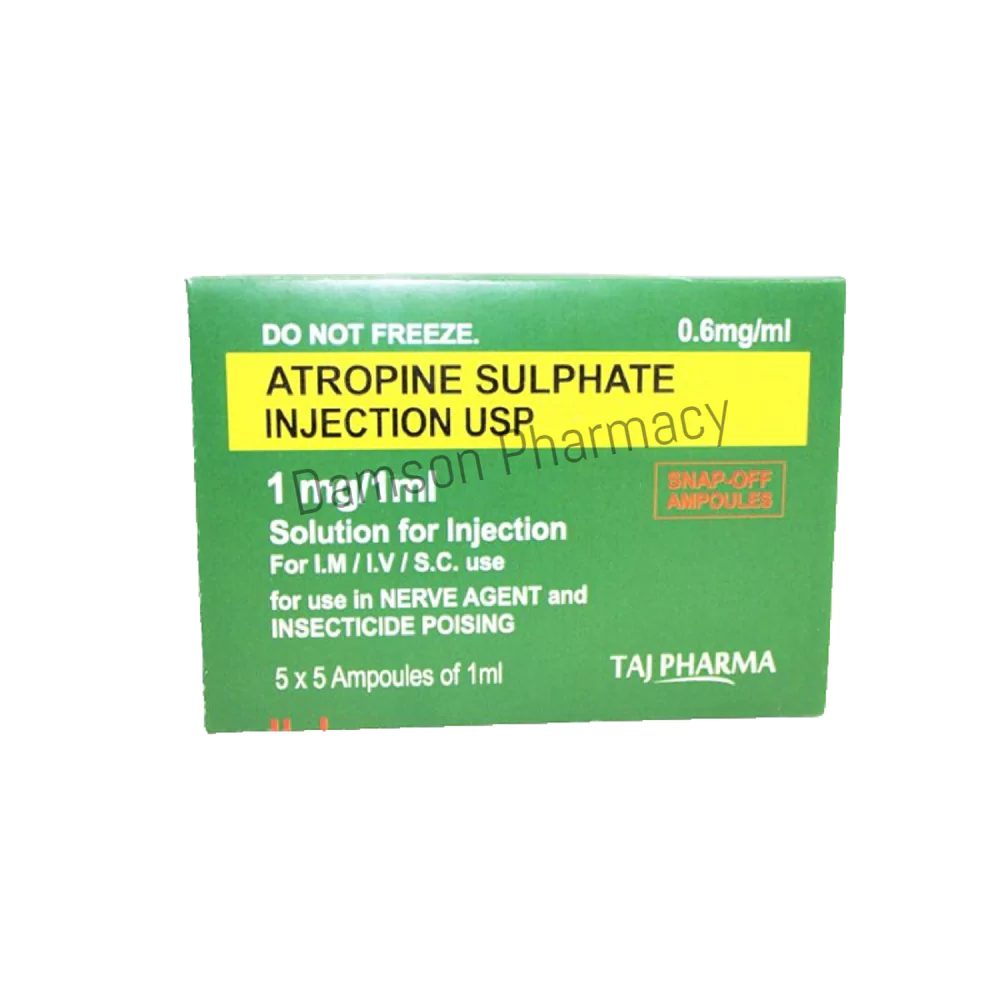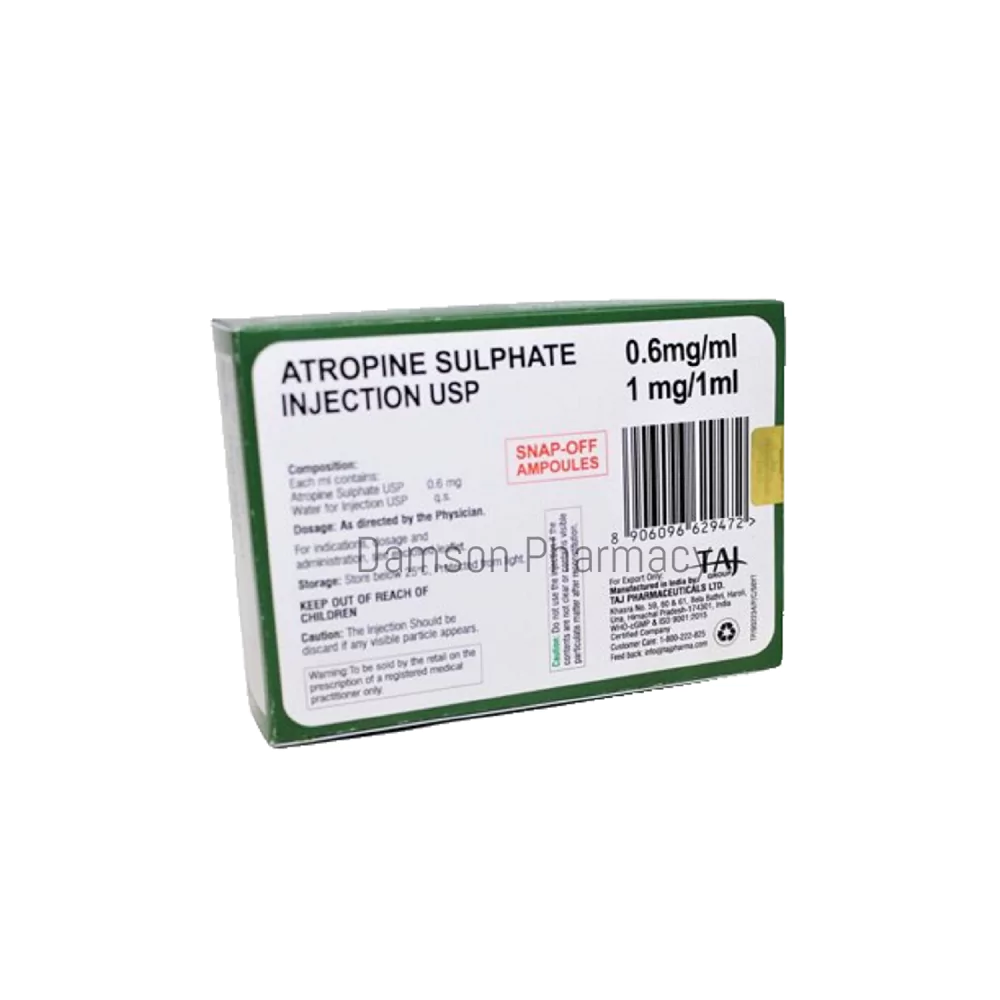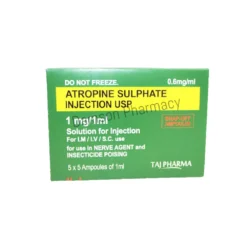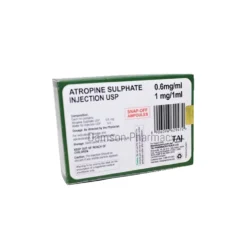Tropine Atropine Injection
$150.00 – $270.00Price range: $150.00 through $270.00
| Pack Size | Price | Price / Unit | Quantity | |
|---|---|---|---|---|
| 10 Injections | $150.00 | $15.00/ unit | ||
| 30 Injections | $270.00 | $9.00/ unit |
Looking for bulk / B2B pricing? | Send Inquiry |

| SKU | 11430 |
| Manufacturer | Neon Laboratories Ltd |
| Categories | Surgical |
| Delivery Time | 10 - 14 Working Days |
| Strength | 0.6ml |
Introduction to Tropine Atropine Injection
Tropine Atropine Injection is a prescription medication primarily used in emergency and surgical settings. It belongs to a class of drugs known as anticholinergics and is derived from the belladonna plant. It is typically administered by healthcare professionals in hospitals or clinics.
This injection is commonly used to treat conditions such as bradycardia (abnormally slow heart rate), and it can also be given to reduce salivation and other secretions during surgery. In some poisoning cases—especially with organophosphates or certain nerve agents—Tropine Atropine Injection is used as a life-saving antidote.
It is fast-acting and administered either intravenously or intramuscularly, depending on the medical need. Tropine helps by blocking certain nerve signals in the body, which assists in regulating heart rate and various involuntary bodily functions.
Uses of Tropine Atropine Injection
Tropine Atropine Injection has several medical uses, and its pharmacological properties make it valuable in various clinical situations. Here are some common uses of Atropine injection:
- Treatment of Bradycardia
- Pre-anesthetic Medication
- Antidote for Organophosphate Poisoning
- Management of Nerve Agent Exposure
- Pupil Dilation in Certain Eye Procedures
How Does Tropine Atropine Injection Works?
Tropine Atropine Injection works by blocking the action of acetylcholine, a neurotransmitter responsible for transmitting nerve signals in the parasympathetic nervous system. By doing this, it helps reduce the effects of excessive parasympathetic activity such as slow heart rate, secretions, and involuntary muscle spasms.
This action allows the heart rate to increase, dries up bodily secretions before surgery, and counteracts the dangerous overstimulation caused by certain toxins or nerve agents. Its effects begin quickly after injection, making it essential in emergency and critical care situations.
Side Effects of Tropine Atropine Injection
- Dry mouth
- Blurred vision
- Dizziness or lightheadedness
- Increased heart rate (tachycardia)
- Difficulty urinating
- Constipation
- Sensitivity to light (photophobia)
- Flushing of the skin
Dosage of Tropine Atropine Injection
The dosage of Tropine Atropine Injection depends on the medical condition being treated, the patient’s age, weight, and clinical situation. It is always administered by a healthcare professional, typically through intravenous (IV) or intramuscular (IM) injection.
For bradycardia, adults are usually given 0.5 mg IV every 3–5 minutes as needed, up to a maximum total dose of 3 mg. In cases of organophosphate poisoning, higher doses may be required and are repeated until symptoms subside. Pediatric dosing is carefully adjusted by body weight and medical need. Dosage must always be individualized and closely monitored by medical staff.
How To Manage Side Effects?
Tropine Atropine Injection involves a combination of preventive measures, close monitoring, and, in some cases, specific interventions. Here are general strategies for managing common side effects of Atropine injection:
- Follow Medical Advice Closely
- Use Sunglasses
- Monitor Heart Rate
- Stay Hydrated
- Urinate Regularly
- Rest in a Cool Place
- Inform Doctor Promptly
Warnings & Precautions
Tropine Atropine Injection, healthcare providers should be aware of certain warnings and precautions associated with its use. These guidelines help ensure the safe and effective use of the medication while minimizing the risk of adverse effects. Here are important warnings and precautions for Tropine Atropine Injection:
1. Contraindications:
- Atropine is contraindicated in individuals with a known hypersensitivity to Atropine or its components.
- It should not be used in patients with narrow-angle glaucoma, as it can increase intraocular pressure.
2. Special Populations:
- Use caution in elderly patients, as they may be more susceptible to the anticholinergic effects of Atropine.
- Pediatric patients may be more sensitive to the effects of Atropine, and dosages should be carefully adjusted based on weight and age.
3. Cardiovascular Conditions:
- Atropine may cause tachycardia and should be used with caution in patients with pre-existing cardiovascular conditions, such as ischemic heart disease or cardiac arrhythmias.
- Monitor patients with heart disease closely for any exacerbation of symptoms.
4. Gastrointestinal Conditions:
- Use Atropine with caution in patients with conditions that may be aggravated by decreased gastrointestinal motility, such as paralytic ileus.
- Atropine may worsen symptoms in patients with ulcerative colitis or other inflammatory bowel diseases.
5. Renal and Hepatic Impairment:
- Adjust the dosage of Atropine in patients with renal or hepatic impairment based on individual patient response and careful monitoring.
6. Myasthenia Gravis:
- Atropine can exacerbate muscle weakness in patients with myasthenia gravis and is generally contraindicated in these individuals.
7. Pregnancy and Lactation:
- Atropine should be used during pregnancy only if the potential benefits justify the potential risks to the fetus.
- Exercise caution when administering Atropine to breastfeeding women, considering the potential for transfer into breast milk.
Storage
- Store at controlled room temperature between 20°C to 25°C (68°F to 77°F).
- Protect from light by keeping the injection in its original packaging.
- Do not freeze the injection as it may damage the medication.
- Keep away from excessive heat and moisture.
- Store out of reach of children and pets to prevent accidental ingestion.
- Do not use if the solution is discolored or contains particles.
Frequently Asked Questions
1. How Do I Use Tropine Atropine Injection Safely?
Tropine Atropine Injection should only be administered by a healthcare professional, usually via intravenous or intramuscular injection, following prescribed doses to ensure safety and effectiveness.
2. Can Tropine Atropine Injection Be Used At Home?
No, this injection is for hospital or clinical use only due to the need for careful monitoring and potential side effects.
3. How Quickly Does Tropine Atropine Injection Work?
The effects typically begin within minutes, making it effective for emergency treatment of slow heart rate or poisoning.
4. Is Tropine Atropine Injection Safe For Elderly Patients?
Elderly patients require cautious use due to increased risk of confusion, dizziness, and heart-related side effects; dosing is adjusted accordingly.
| Pack Size | 10 Injections, 20 Injections, 30 Injections |
|---|---|
| Price/Unit | $12/unit, $15/unit, $9/unit |
Be the first to review “Tropine Atropine Injection” Cancel reply
Related Products
No related Products Found









Reviews
There are no reviews yet.